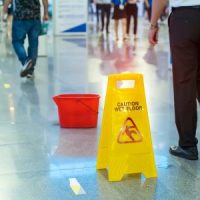Florida Slip and Fall Accidents

Slip and fall accidents can and do happen anywhere, whether it’s a grocery store aisle, a dim restaurant or bar, or even someone’s home. Wherever they occur, slip and fall accidents should be taken seriously, as they can result in severe injuries. Fortunately, in Florida, slip and fall victims can often recover compensation from the negligent property owners who are to blame for the accident in the first place. Read on to learn more about the legal obligation of property owners in Florida and your own potential legal options after a slip and fall accident.
Understanding Premises Liability
Premises liability is a legal concept under which property owners can be held liable for failing to keep their properties safe for visitors. These claims can arise when a property owner fails to take reasonable steps to address hazards on their premises, such as conducting regular inspections, keeping their property clean, and repairing any hazards that they do discover. A property owner who fails to take these steps could end up being the cause of a slip and fall accident and eventually held responsible for paying the injured party’s accident-related losses, including medical bills, lost wages, and pain and suffering. In order to recover these losses, however, an injured party will need to be able to prove that the property owner knew or should have known about the hazardous condition, but failed to correct it.
Examples of Property Owner Negligence
Even something as seemingly simple as an icy sidewalk can be dangerous for visitors, which is why it’s so important for property owners to take such care to keep their premises safe. Property owners and visitors alike should also keep an eye out for potential dangers, including:
- Uneven or sloping flooring;
- Torn carpeting;
- Broken handrails;
- Insufficient lighting;
- Cluttered aisles;
- Electrical cords and other tripping hazards; and
- Leaks, puddled water, spills, and slick flooring.
These kinds of hazards can easily cause a visitor to slip and fall, resulting in potentially serious injuries.
Common Slip and Fall Injuries
Like any type of accident, slip and fall incidents can result in a wide range of injuries. However, the kinds of trauma that are inflicted in slip and fall accidents do tend to result in certain injuries, including:
- Abrasions and bruising;
- Lacerations;
- Sprains and strains;
- Soft tissue injuries;
- Broken bones; and
- Head trauma.
Diagnosing, treating, and recovering from these kinds of injuries can be time-consuming and expensive, which is why accident victims are often required to seek compensation from the negligent property owner who caused their accident in the first place.
Schedule a Free Initial Case Review
Resolving a slip and fall claim can be complicated, as property owners and their insurers are rarely willing to accept an accident victim’s first request for compensation, even when it is valid. Having an experienced Florida slip and fall attorney on your side can make all the difference in the outcome of this type of case. To get started on your own claim, please call the offices of Boone & Davis at 954-566-9919 today and a member of our legal team will help you set up a free consultation.
Sources:
floridabar.org/the-florida-bar-journal/premises-liability-a-notable-rift-in-the-law-of-foreseeable-crimes/
leg.state.fl.us/Statutes/index.cfm?App_mode=Display_Statute&URL=0700-0799/0768/Sections/0768.0755.html
